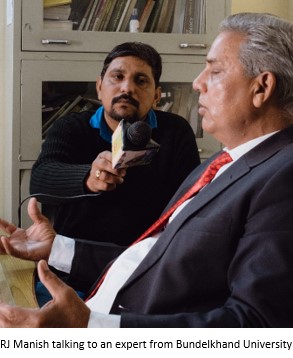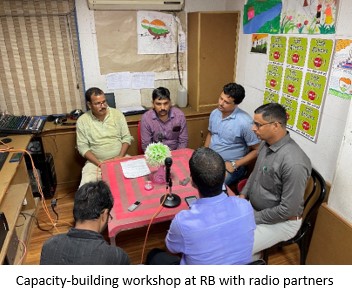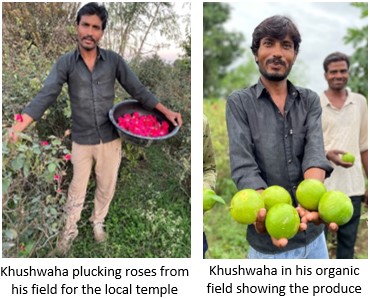Radio Bundelkhand: A Messiah for the Local Population
Deep
in the heart of India lies the Bundelkhand region of Tikamgarh district,
Madhya Pradesh, where men try to eke out a living through agriculture or
daily wage labour and women are left at home with the burden of household
chores. Water is scarce in here due to arid conditions and a lack of
water infrastructure. Each day a member from every household makes an hour
or two of backbreaking effort to fetch water from the community well or hand
pump. Despite several long-standing efforts and investments by the
government to ensure that every citizen can access clean drinking water,
regular access to safe drinking water remains a challenge in rural India. The
scarcity of drinking water has significant health ramifications and,
therefore, continues to be a major cause for limiting socio-economic
development. The daytime temperature hovers above 40°C in Bundelkhand from
April to August resulting in water tanks and wells drying up and increasing
the time and distance taken by women to fetch water.
The information needs of rural communities living in climate-sensitive regions are drastically different from those of urban regions. Rural communities are dependent on agriculture as their main source of livelihood and require information about agriculture-related adaptation measures and government schemes on climate-resilient farming practices. With recurring droughts and over 80% of the population dependent on agriculture, climate change is posing an increasing threat to the livelihood security of the rural community. Vulnerable communities are not yet convinced about adopting sustainable adaptation measures owing to the lack of correct methods of awareness efforts and the absence of a strong capacity to manage climate threats.
 Radio Bundelkhand: The Community-owned Radio Station
Radio Bundelkhand: The Community-owned Radio Station
As an answer to these issues, Radio Bundelkhand is a community-owned and produced radio station that is dedicated to the concerns of rural communities in the Bundelkhand region. It is a popular, cost-effective, and non-literate-friendly communication medium in the area. The radio station follows the participatory and collaborative approach of empowering and building consensus for change. This powerful medium has been helping in meeting the requirements of the local communities by producing and broadcasting programmes that are of local relevance and interest, as well as using infotainment to address the local people’s concerns. Radio Bundelkhand allows people to have more access to information, understand their own needs, express their concerns, and be heard in the hopes that their problems will be addressed, and solutions found that will enable them to improve their lives. Radio Bundelkhand broadcasts and narrowcasts the required information to community members. The daily and weekly dissemination of information on agro-met data in the Bundeli dialect makes it comprehensible for local listeners. Radio Bundelkhand also takes queries and information needs of the community members to the scientists and then disseminates the learnings from the latter to the former in simple, easy-to-understand language. Moreover, it broadcasts information on government policies related to climate-resilient agriculture to the rural population regularly.
The Shubh Kal Campaign
 Radio Bundelkhand under the
Shubh Kal Campaign (a climate-change
communication campaign for a better future) has been informing and educating
the rural community regarding the risk of climate change and possible
adaptation options. The campaign aims to strengthen community knowledge and
voice on climate change impacts and adaptation by increasing their input
into local research and action at the grassroots level. The project enables
communities to share their experiences in coping with and adapting to
climate change. In the campaign, emphasis is given on strengthening the
capacity of community radio reporters to advocate climate issues at the
community level and beyond. An innovative model of learning, knowledge
sharing, and action to connect community, environment journalists,
researchers, scientists, and policymakers has been developed through the
programme. The model (an e-platform) is a new space where a range of
stakeholders can learn about climate change adaptation practices and their
impacts and advocate responses that address local community’s needs. The
updatable knowledge-sharing platform is developed in Hindi with locally
relevant and easily comprehensible training modules, messages, folk songs,
and radio programmes. Through this programme, Radio Bundelkhand found out
that 77% of people's main source of livelihood is agriculture in the region
and they are daily wage workers. The radio station also discovered that 36%
of the
people think climate change and weather as the same thing. After
listening to the programmes related to climate change on Radio Bundelkhand,
it has been observed that there has been a behavioural change at the ground
level here.
Radio Bundelkhand under the
Shubh Kal Campaign (a climate-change
communication campaign for a better future) has been informing and educating
the rural community regarding the risk of climate change and possible
adaptation options. The campaign aims to strengthen community knowledge and
voice on climate change impacts and adaptation by increasing their input
into local research and action at the grassroots level. The project enables
communities to share their experiences in coping with and adapting to
climate change. In the campaign, emphasis is given on strengthening the
capacity of community radio reporters to advocate climate issues at the
community level and beyond. An innovative model of learning, knowledge
sharing, and action to connect community, environment journalists,
researchers, scientists, and policymakers has been developed through the
programme. The model (an e-platform) is a new space where a range of
stakeholders can learn about climate change adaptation practices and their
impacts and advocate responses that address local community’s needs. The
updatable knowledge-sharing platform is developed in Hindi with locally
relevant and easily comprehensible training modules, messages, folk songs,
and radio programmes. Through this programme, Radio Bundelkhand found out
that 77% of people's main source of livelihood is agriculture in the region
and they are daily wage workers. The radio station also discovered that 36%
of the
people think climate change and weather as the same thing. After
listening to the programmes related to climate change on Radio Bundelkhand,
it has been observed that there has been a behavioural change at the ground
level here.
Transformation at the Ground Level
 Dinesh Khushwaha is a living example of this transformation. He has been
listening to the
Shubh Kal programme for over seven years. From the use of
chemical fertilisers to fully organic farming, Dinesh thanks radio reporters
and the Shubh Kal programme for crediting this change. Radio reporters often
convey Dinesh’s concerns about farming practices to experts who share their
expertise on the subject. Dinesh is proud to be 100% organic in his farming
practices. He now recognises that organic farming is the future of farming
as it does not harm the
environment. Switching to organic farming has helped
him ask for a better price for his produce, which has further improved his
and his family’s economic conditions. He is also a flag-bearer for organic
farming in his village and tries to encourage other farmers to engage in
climate-friendly farming, all of which he credits to Radio Bundelkhand for
providing all the relevant
information.
Dinesh Khushwaha is a living example of this transformation. He has been
listening to the
Shubh Kal programme for over seven years. From the use of
chemical fertilisers to fully organic farming, Dinesh thanks radio reporters
and the Shubh Kal programme for crediting this change. Radio reporters often
convey Dinesh’s concerns about farming practices to experts who share their
expertise on the subject. Dinesh is proud to be 100% organic in his farming
practices. He now recognises that organic farming is the future of farming
as it does not harm the
environment. Switching to organic farming has helped
him ask for a better price for his produce, which has further improved his
and his family’s economic conditions. He is also a flag-bearer for organic
farming in his village and tries to encourage other farmers to engage in
climate-friendly farming, all of which he credits to Radio Bundelkhand for
providing all the relevant
information.
In the dying age of radio, Radio Bundelkhand is emerging as a trendsetter in the community radio sector. The amount of authentic information shared on climate change and how this information reaches the most underprivileged communities of the region is commendable. To see the communities benefitting is an example of a successful two-way communication model.
Kirandeep Kaur
kkaur@devalt.org